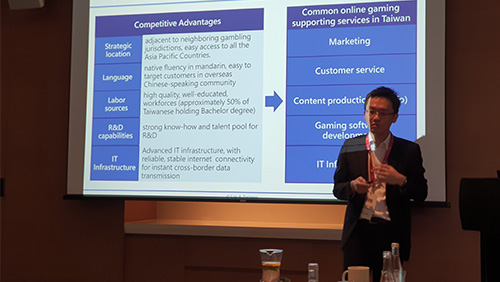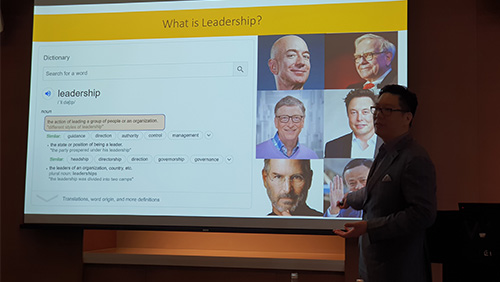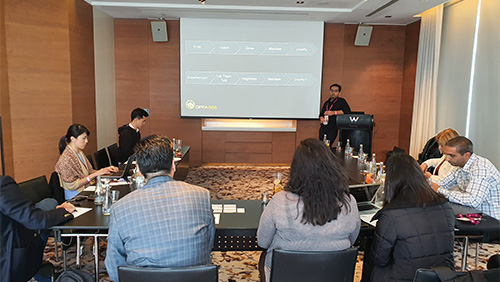The final day of Asia Gaming Summit Taiwan got a lot more focused, as attendees signed up for workshops to drill down on a few important topics. Important topics like Taiwan regulations, leadership in business, social media and affiliates in the Asian region, and chatbots were the focus of the day.
 The day began with a detailed overview of Taiwan’s gambling laws from David Lee and George Lin of Lin & Partners. They explained that Taiwan is very friendly to investment, with high macro-economic stability and innovation capability. But it can improve in some areas, like getting credit and trading across borders.
The day began with a detailed overview of Taiwan’s gambling laws from David Lee and George Lin of Lin & Partners. They explained that Taiwan is very friendly to investment, with high macro-economic stability and innovation capability. But it can improve in some areas, like getting credit and trading across borders.
So where does the gambling regulations sit at the moment? There are laws that could allow casinos to develop if referendums pass, but casinos aren’t coming to Taiwan anytime soon, they said, because the government has promised they won’t. Elections don’t look likely to change that in 2020. A lottery and sports lottery are each operating in the country, but otherwise, offering gambling to Taiwanese people is illegal. Having a foreign facing operation, where bets are taken or cash flow comes through, is also illegal
But providing services to operators, like customer service, marketing, and IT infrastructure is permitted. Lin & Partners have helped get confirmation letters from the Ministry of Economic Affairs (MOEA) for these types of businesses.
Overall, Taiwan offers plenty of great reasons to be a base of operations, including its Chinese language skills, infrastructure, and talented workforce.
Next to present was Calvin Shueh, Asia iGaming Expert, on “Discover the real potential and true value of leadership and human capital.” He focused on the importance of leadership to the modern business, and the techniques leaders can use to help motivate their teams.
At different stages of a company, different leadership could be necessary. Companies start with drivers, who have a vision and are willful enough to get there. It then must turn to inspiring leaders to keep things going. When the ball is fully rolling, friendly leaders are required to keep everything together. When the goal has essentially been reached, analytical leaders can help optimize results. Finally, to avoid stagnation, new drivers must be brought in to start the whole process again.
 He also explained how through Neuro-Linguistic Programming and Myers-Briggs tests, leaders can better understand the way their individual team members work and what drives them. Understanding these factors and communicating to them can bring a leader to the next level.
He also explained how through Neuro-Linguistic Programming and Myers-Briggs tests, leaders can better understand the way their individual team members work and what drives them. Understanding these factors and communicating to them can bring a leader to the next level.
After the lunch break, Bhavesh Parthi shared his expertise on building an Affiliate network, and the importance of social media to that goal, particularly in Asia.
Affiliates should be treated as individuals and each treated uniquely, he emphasized. Affiliate managers should not send out template messages, but tailor every communication to make each affiliate feel valued. They can help as brand advocates for a company. But they can also increase risk, create PR nightmares, and require guidance. Asian affiliates are less mature than their European counterparts, so they need more knowledge and must be trained on many things.
He also hammered home that Incentives are like drugs to affiliates. A good contest, like a new iPhone to the best performing affiliate, can help drive huge numbers to a site.
Parthi explained the pros and cons of different ways to build out affiliate management networks. Building your own can be expensive, but allows full control over the network. Hiring a third party expert can create fast results, but has risks like stolen data, and can bring everything back to square one when the relationship ends. It can also be outsourced for instant affiliates bringing in volume, but again lacks a long term sense of security.
 To build that affiliate network, he noted that methods can include social media, forums, especially in China, stealing from other affiliates, and in managing relationships with friends and friends of friends by meeting them face to face and trying to bring them in. These networks must then be managed with ongoing personal relationships, trust building, and incentives to keep them earning and motivated.
To build that affiliate network, he noted that methods can include social media, forums, especially in China, stealing from other affiliates, and in managing relationships with friends and friends of friends by meeting them face to face and trying to bring them in. These networks must then be managed with ongoing personal relationships, trust building, and incentives to keep them earning and motivated.
Otherwise, brands can grow by leveraging social media in many ways. News posts, YouTube videos, review websites, forums, Instagram can all be utilized to create better awareness amongst affiliates and potential customers.
Finally, Kevin Peng of Sinitec gave the workshop attendees a look at his company’s chatbot AI platform. Chatbots have come a long way, and Peng showed off how the technology can be configured for multiple languages and provide elegant decision trees for customers, while diverting traffic to a real agent when requested or appropriate.
With the end of that last workshop, the Asia Gaming Summit Taiwan 2019 officially came to an end. Attendees left better prepared to navigate the difficult regulatory space that is Asia, and with a better eye towards how to approach the market and the new opportunities its continually presenting.
